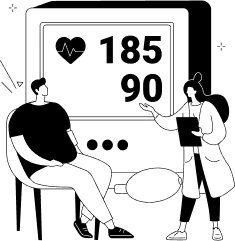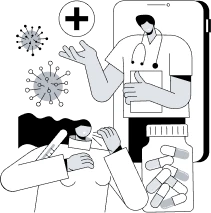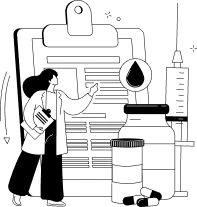- How AI is Transforming the UAE Healthcare Ecosystem
- Latest AI Innovations in Healthcare in Dubai
- Launch of Global AI Healthcare Academy
- Med42's AI Clinical Language Model
- M42’s Development of AIRIS-TB
- Airdoc's AI Retinal Image Interpretation System
- Key Benefits of Artificial Intelligence in Healthcare UAE
- AI-Powered Telemedicine & Virtual Care
- AI-Driven Robotic Surgery and Minimally Invasive Procedures
- Optimizing Healthcare Operations and Workflow Efficiency
- Enhanced Diagnostics and Early Disease Detection
- Tailored Treatment and Precision Medicine
- AI in Wearable Health Technology and Remote Monitoring
- AI in Elderly Care and Assisted Living
- AI for Smart Hospitals and Automated Patient Management
- AI in Healthcare in Dubai: Real-Life Applications and Success Stories
- Fakeeh University Hospital’s AI-Driven Remote Patient Monitoring
- NABIDH Health Exchange’s AI-Powered Predictive Analytics
- Insilico Medicine Advancing the World’s First Fully AI-Generated Drug
- Dubai Health Authority’s AI-Enhanced Precision Medicine
- King’s College Hospital Dubai’s AI-Assisted Robotic Surgery
- Implementing AI in Healthcare: A Practical Roadmap
- Define Objectives and Use Cases
- Choose the Right AI Technologies
- Integrate AI with Existing Systems
- Train Healthcare Professionals
- Pilot and Test AI Solutions
- Monitor Performance and Optimize
- Understanding the Limitations of AI in Healthcare and Strategies for Improvement
- Bias and Generalization Challenges
- Integration with Existing Systems
- Lack of Transparency
- Data Quality and Availability
- Future of AI in UAE’s Sprawling Healthcare System
- Achieve Seamless AI Integration in Healthcare with Appinventiv Dubai
- FAQs
- Q. How is AI transforming the UAE healthcare ecosystem?
- Q. What is the cost of implementing Artificial Intelligence in healthcare in the UAE ?
- Q. What are the benefits of AI in healthcare?
The UAE has transformed from a regional healthcare provider to a global leader in AI-powered medical innovation in just a few decades. Today, the country is pioneering the integration of artificial intelligence to revolutionize diagnostics, treatment, and administration in healthcare.
From AI-driven predictive analytics that detect diseases before symptoms appear to intelligent automation optimizing hospital workflows, the UAE is setting a new benchmark for healthcare excellence.
Backed by the National Strategy for Artificial Intelligence 2031, AI adoption in healthcare is accelerating at an unprecedented rate. With the UAE’s AI healthcare market projected to reach $138 million by 2030 at an annual growth rate of 34.6%, the country is making massive strides toward becoming a global hub for AI-driven healthcare solutions. (Source: Grand View Research)
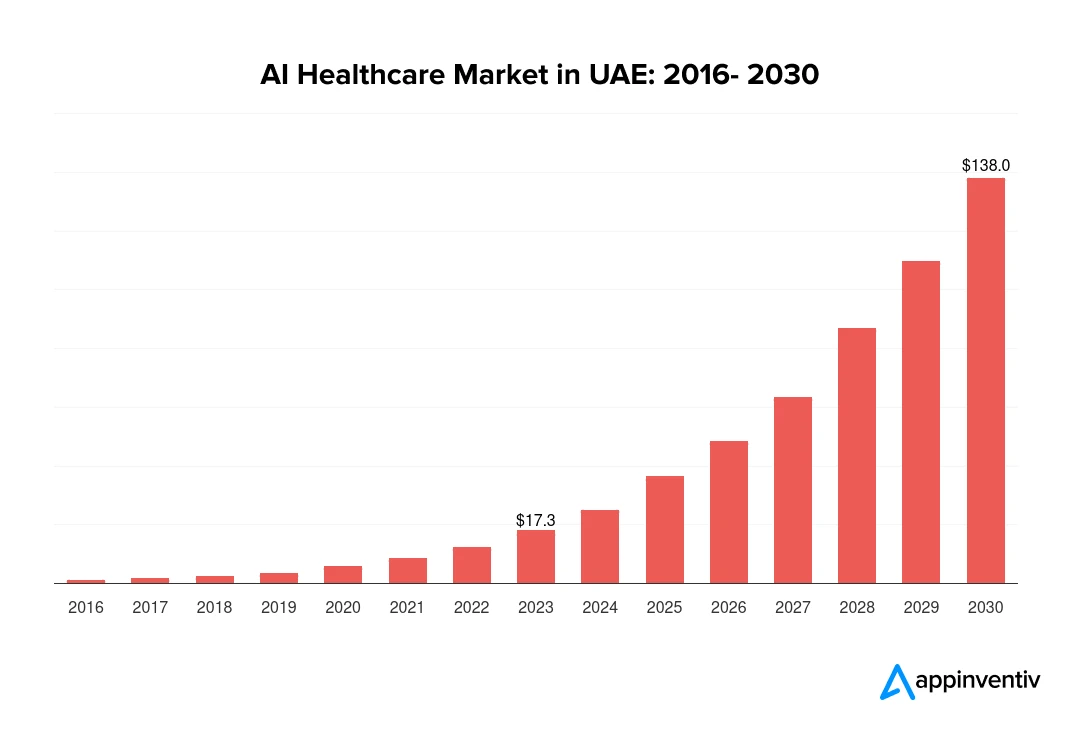
However, as AI in healthcare in Dubai continues to evolve, challenges such as data security, regulatory compliance, and ethical considerations must be addressed. The city is tackling these issues through robust policies, strategic investments, and global partnerships, ensuring AI-driven healthcare remains safe, efficient, and innovative. With strong government backing and cutting-edge technology, Dubai sets a new international benchmark for AI-powered healthcare solutions.
This blog will discuss how AI revolutionizes healthcare in Dubai, UAE, explore real-life use cases, and delve into the latest AI innovations shaping the industry.
With AI adoption growing at 34% annually, now is the time to revolutionize your healthcare system. Stay ahead with cutting-edge innovation.
How AI is Transforming the UAE Healthcare Ecosystem
The UAE, one of the most economically advanced markets in the GCC, has been transforming its healthcare sector with a focus on digitalization and AI. The Centennial 2071 Plan, launched in 2017, aims to develop healthcare infrastructure and services that meet international standards, particularly in addressing lifestyle-related diseases. The country is also positioning itself as a leading destination for medical tourism, with strong government backing and AI initiatives playing a pivotal role in this vision.
In line with these efforts, the UAE’s National Strategy for Artificial Intelligence 2031 aims to make the country a global leader in AI, particularly in healthcare. Key projects such as the Falcon AI model developed by the Advanced Technology Research Council (ATRC) and AI-powered medical claims systems in Dubai Healthcare City are addressing critical issues like doctor shortages and chronic disease management. These innovations are streamlining healthcare operations and improving diagnostic accuracy.
The UAE’s healthcare market is poised for significant growth, driven by AI advancements in telemedicine, personalized medicine, and AI-assisted diagnostics. With robust investments in AI research and development and partnerships with global tech companies, the UAE is rapidly advancing toward becoming a global leader in AI-powered healthcare, offering enhanced care and operational efficiency.
Latest AI Innovations in Healthcare in Dubai
The healthcare sector in Dubai is driven by the latest innovations, making it more efficient, accurate, and accessible. Some of the latest innovations of AI in healthcare include:
Launch of Global AI Healthcare Academy
In May 2024, the Department of Health – Abu Dhabi launched the Global AI Healthcare Academy in collaboration with Mohamed bin Zayed University of Artificial Intelligence (MBZUAI) and Core42. This initiative is a significant step toward advancing artificial intelligence in healthcare in the UAE, aiming to develop a skilled AI workforce to enhance diagnostics and patient care.
The academy will support the UAE’s mission to become a leading center for AI-driven healthcare by nurturing local talent and promoting innovative solutions to address regional health challenges. It will also focus on improving clinical care by creating AI tools tailored to the needs of the UAE’s healthcare system.
Med42’s AI Clinical Language Model
Med42, a health-tech company based in Abu Dhabi, developed an open-access AI clinical language model that is comparable in performance to leading models like GPT-4 and Med-Gemini. The model has achieved high accuracy in medical examinations, including the USMLE.
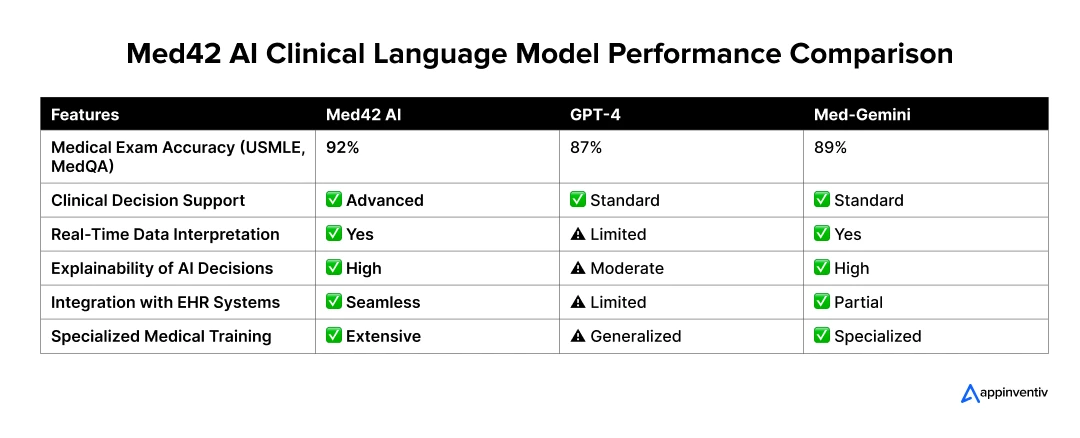
Being implemented in the UAE’s healthcare system, Med42 assists healthcare professionals by enhancing diagnostic capabilities and decision-making processes. Moreover, the model is specifically adapted to the UAE’s healthcare needs, providing more personalized and effective solutions to local healthcare providers.
M42’s Development of AIRIS-TB
AIRIS-TB, an AI-driven chest X-ray system developed by M42, is revolutionizing tuberculosis (TB) screenings in the UAE by processing up to 2,000 chest X-rays daily and reducing radiologist workload by up to 80%.
The role of AI in healthcare in Dubai is becoming increasingly vital, especially in the UAE’s efforts to combat TB. It allows for early detection, faster treatment initiation, and better resource utilization in healthcare facilities, contributing to the country’s goal of eradicating TB.
Airdoc’s AI Retinal Image Interpretation System
Although detailed information on Airdoc’s AI retinal image interpretation system in the UAE is not readily available, the country’s healthcare system is increasingly incorporating AI tools like Airdoc’s to enhance diagnostic capabilities, particularly in ophthalmology.
AI in medicine and healthcare is transforming diagnostics in the UAE by streamlining the detection of eye diseases and chronic conditions. Advanced AI systems enable healthcare professionals to quickly analyze retinal images, leading to faster, more accurate diagnoses and improved treatment outcomes. This innovation enhances patient care and reinforcing the country’s position as a leader in healthcare AI solutions in the UAE.
Key Benefits of Artificial Intelligence in Healthcare UAE
AI in healthcare in Dubai is transforming the way medical services are delivered, driving innovation and enhancing operational efficiency. With the adoption of advanced technologies, the healthcare sector is experiencing a shift towards more personalized and efficient patient care. Let’s see how AI is used in healthcare and what benefits it offers.
AI-Powered Telemedicine & Virtual Care
Artificial intelligence integration in the UAE healthcare industry transforms telemedicine by providing innovative remote healthcare solutions that enhance accessibility and efficiency. AI chatbot in healthcare and virtual assistants assist patients by offering medical guidance, scheduling appointments, and delivering real-time health recommendations.
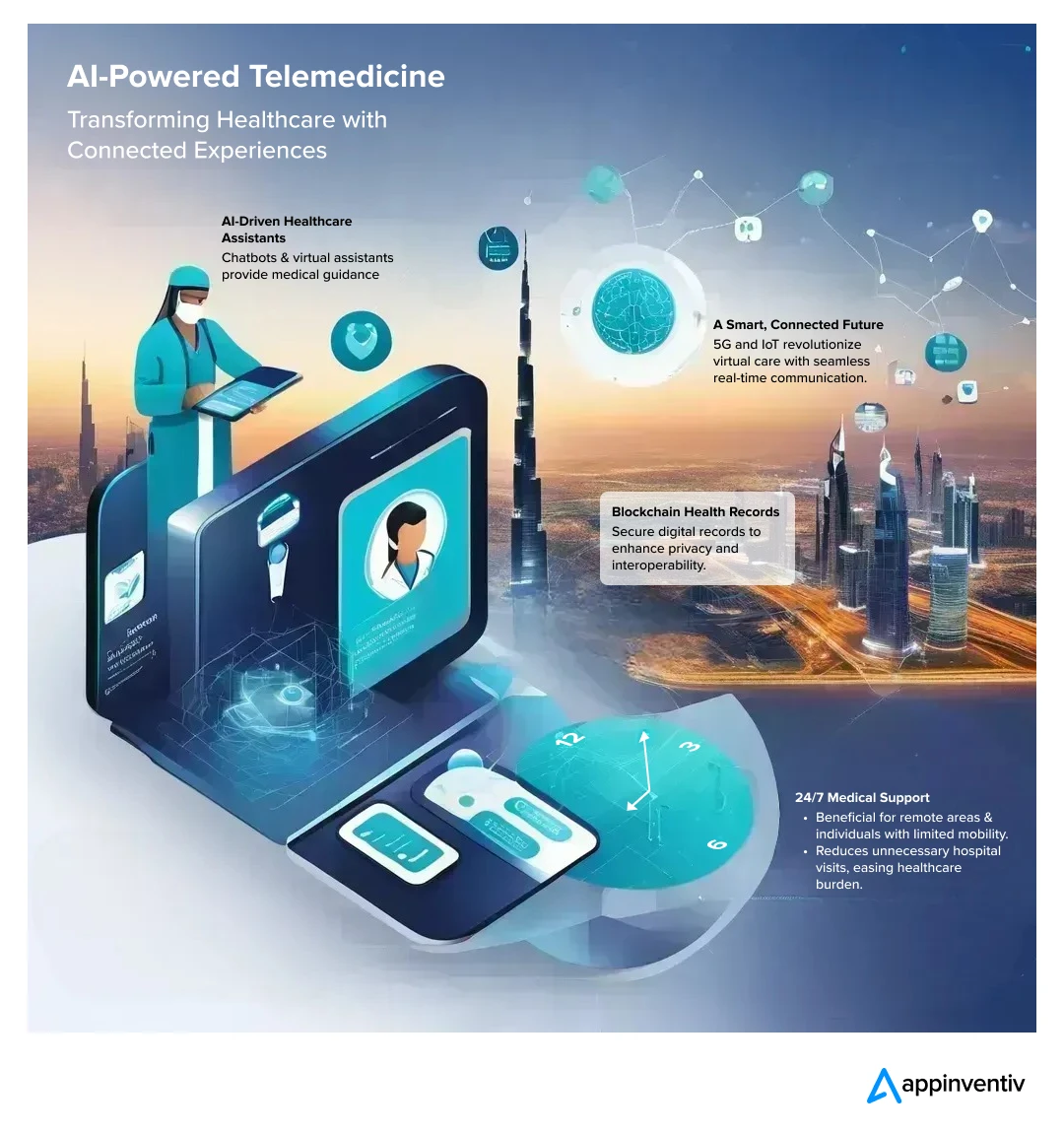
The use of AI in healthcare in Dubai is revolutionizing the healthcare landscape by ensuring 24/7 availability of medical support, especially for individuals in remote areas or those with limited mobility. AI-powered telemedicine platforms are streamlining healthcare delivery by reducing the need for unnecessary hospital visits and easing the burden on healthcare facilities. This advancement enables Dubai to create a more connected, accessible, and patient-centric healthcare system, making it a model for the future of healthcare innovation.
AI-Driven Robotic Surgery and Minimally Invasive Procedures
Robotic-assisted surgery, powered by AI, enhances surgical precision and reduces risks in complex medical procedures across hospitals in the UAE. These advanced robotic systems provide real-time insights, helping surgeons perform intricate operations with greater accuracy and control.
AI-powered surgical automation enables minimally invasive procedures, leading to faster recovery times, shorter hospital stays, and reduced post-surgical complications. Surgeons can also leverage AI-driven simulations for detailed pre-surgical planning, increasing the success rates of complex operations. By integrating AI into surgical practices, the UAE is establishing itself as a cutting-edge, technology-driven healthcare leader.
Optimizing Healthcare Operations and Workflow Efficiency
AI is revolutionizing hospital management in the UAE by automating routine administrative tasks such as appointment scheduling, medical billing, and electronic health record management. This automation reduces paperwork, streamlines workflows, and allows healthcare professionals to dedicate more time to patient care.
The utilization of artificial intelligence in healthcare in the UAE is revolutionizing resource allocation, ensuring the most effective use of medical staff, equipment, and infrastructure. This digital transformation bolsters the UAE’s healthcare system, making it more responsive, efficient, and patient-friendly.
Enhanced Diagnostics and Early Disease Detection
AI-powered medical diagnostic solutions are reshaping medical imaging by accurately detecting diseases such as cancer, cardiovascular conditions, and neurological disorders. These advanced technologies support radiologists in identifying abnormalities at earlier stages, leading to improved patient outcomes and increased survival rates. AI in healthcare in Dubai plays a crucial role in reducing diagnostic errors, ensuring greater precision in medical assessments, and enhancing the overall quality of care.
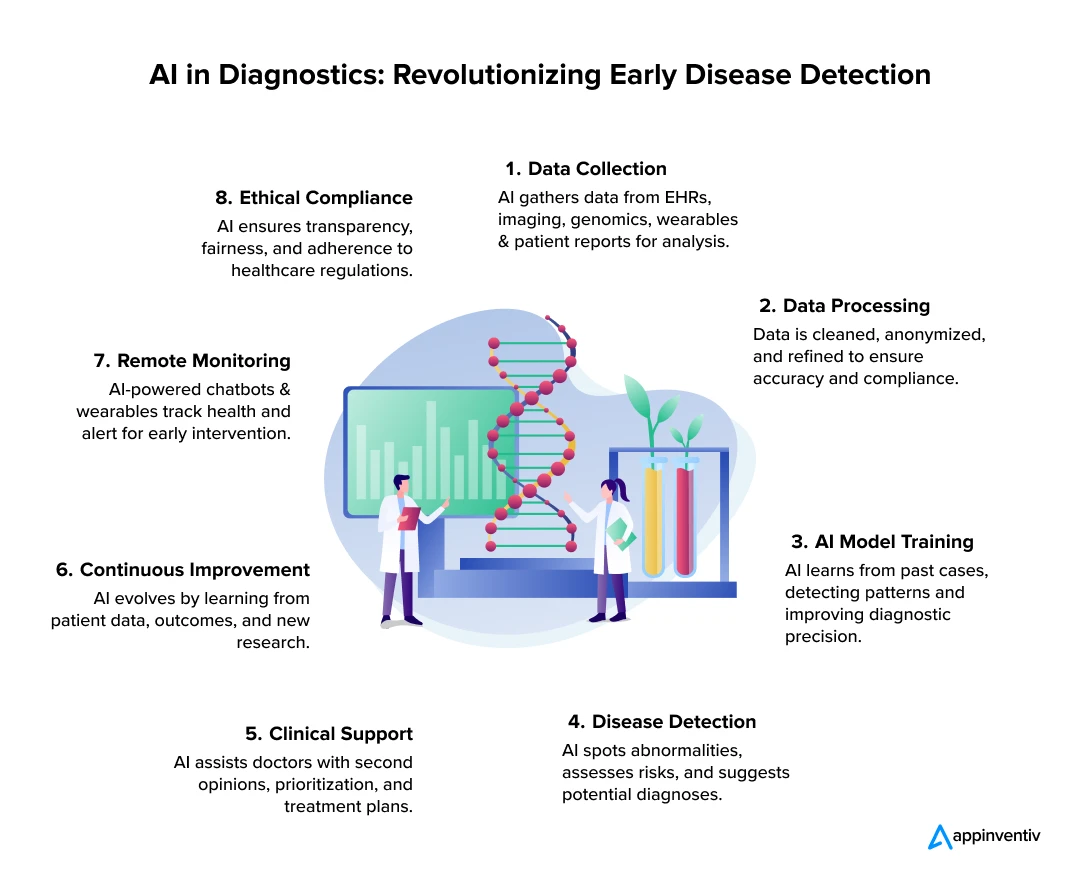
By incorporating AI into diagnostic workflows, healthcare providers in the UAE can significantly enhance efficiency while reducing the workload on specialists. Faster, AI-assisted diagnoses enable more timely medical interventions, ultimately improving the overall quality of healthcare services.
Tailored Treatment and Precision Medicine
AI empowers healthcare professionals in the UAE to deliver highly personalized treatment plans by analyzing a patient’s genetic data, medical history, and lifestyle habits. This data-driven approach ensures that treatments are tailored to individual needs, increasing effectiveness while minimizing side effects and unnecessary medical interventions.
AI-driven healthcare predictive analytics help doctors identify the most suitable patient therapies, improving treatment outcomes and enhancing recovery rates. This is particularly beneficial for managing chronic conditions such as diabetes, cardiovascular diseases, and cancer. The adoption of generative AI in healthcare in Dubai, UAE, aligns with the country’s commitment to driving an advanced, patient-focused healthcare ecosystem that prioritizes quality and efficiency.
AI in Wearable Health Technology and Remote Monitoring
AI-powered wearable devices in healthcare are revolutionizing how people in the UAE manage their health. These smart devices continuously track vital signs like heart rate, blood pressure, and glucose levels, providing instant alerts if anything seems off. AI-driven remote monitoring allows doctors to monitor patients with chronic conditions, reducing unnecessary hospital visits and ensuring timely interventions.
This is especially valuable for elderly individuals and those managing diabetes or hypertension. By promoting proactive healthcare, AI wearables align perfectly with the UAE’s vision of a tech-driven, healthier future.
At Appinventiv, we developed DiabeticU, a diabetes management app that allows users to manage their diabetes with accuracy. It features personalized tools and seamless integration with wearable devices.
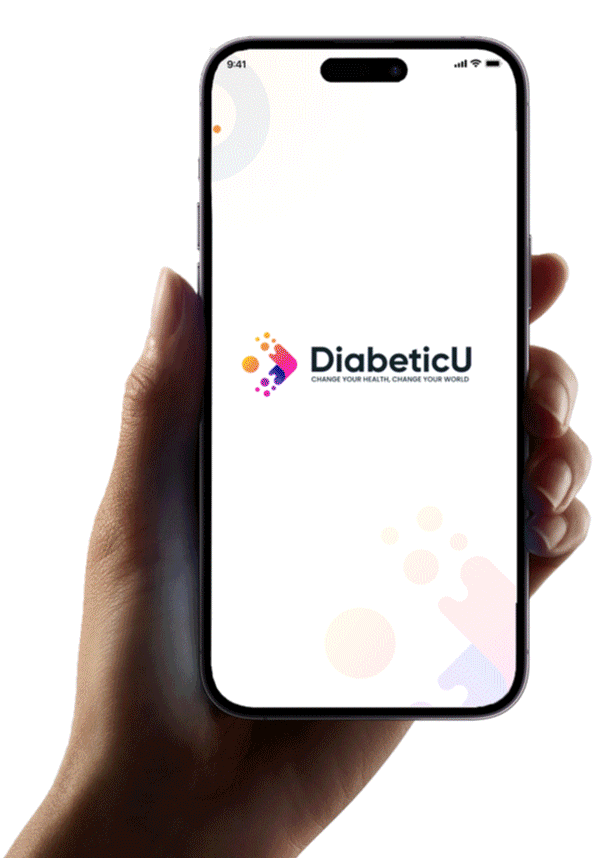
This innovation resulted in improved health outcomes for thousands of individuals dealing with diabetes, giving users the ability to monitor and manage their condition effortlessly.
AI in Elderly Care and Assisted Living
AI is making life easier and safer for senior citizens in the UAE by providing smart health monitoring and assistance. AI-powered virtual caregivers remind elderly individuals to take medications, stay hydrated, and exercise, ensuring they follow healthy routines. Advanced machine learning algorithms detect early signs of cognitive decline, helping in the early diagnosis of conditions like Alzheimer’s and dementia.
AI-powered robotic companions offer emotional support and assist with daily tasks, promoting independence and improving quality of life. With AI-driven elderly care, the UAE is creating a future where seniors receive the support they need while maintaining their dignity and autonomy.
AI for Smart Hospitals and Automated Patient Management
Hospitals in the UAE are becoming smarter and more efficient with AI-driven automation. AI helps manage patient admissions, bed availability, and discharge processes, reducing long wait times and administrative burdens. Predictive analytics ensure hospitals have the right number of doctors and nurses available when needed most.
AI-powered smart hospital systems also monitor air quality, lighting, and sanitation, creating a safer and more comfortable patient environment. By embracing AI in healthcare in Dubai, hospitals are setting new benchmarks in efficiency, patient care, and operational excellence.
AI in Healthcare in Dubai: Real-Life Applications and Success Stories
AI applications in healthcare in Dubai, UAE, are revolutionizing the medical field with innovative solutions that enhance patient care and operational efficiency. Let’s check out some of the top use cases of AI integration in healthcare with real-life examples.
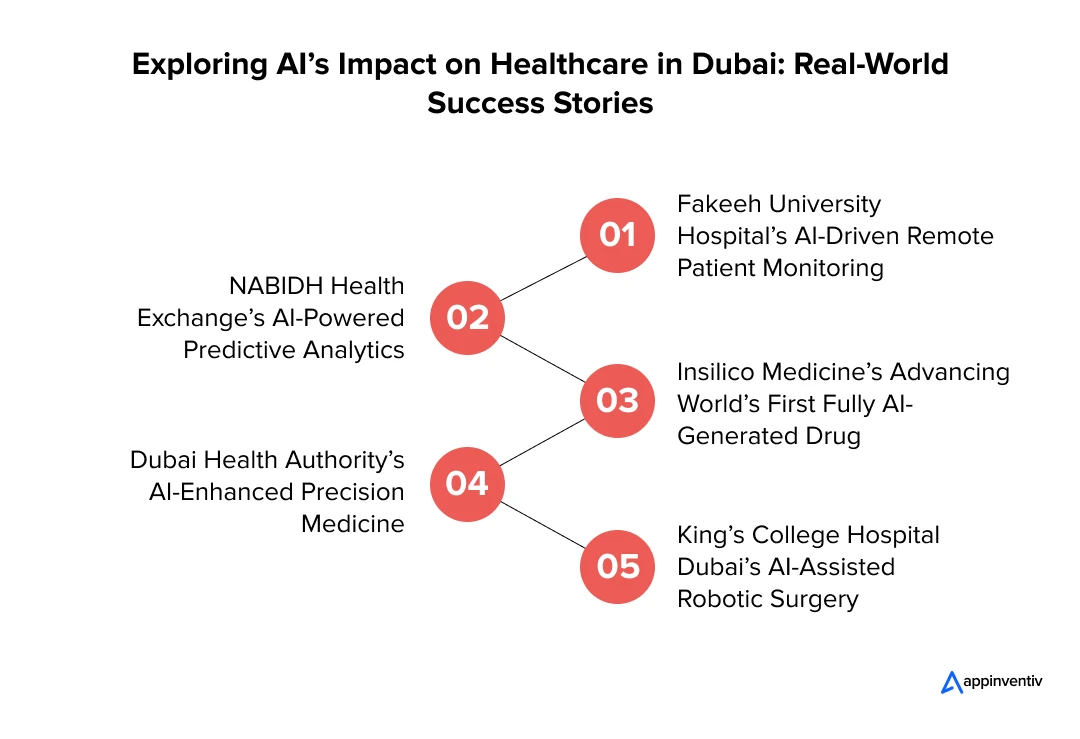
Fakeeh University Hospital’s AI-Driven Remote Patient Monitoring
AI-powered RPM systems help doctors monitor patients with chronic illnesses like diabetes, heart disease, and respiratory conditions remotely. Smart wearables and IoT-enabled devices collect real-time patient data, alerting healthcare providers to abnormalities.
Hospitals like Fakeeh University Hospital integrate AI-driven telemedicine for virtual consultations, allowing patients to receive expert care from home. This reduces hospital visits and improves healthcare accessibility for elderly and high-risk patients. AI algorithms also analyze patient trends, predicting potential health issues before they escalate.
NABIDH Health Exchange’s AI-Powered Predictive Analytics
AI-powered predictive models analyze patient data to forecast disease outbreaks and assess health risks. Dubai’s NABIDH Health Information Exchange leverages AI to track disease patterns and support public health initiatives.
By analyzing health trends, AI helps policymakers and medical institutions prepare for potential health crises. AI also assists in identifying high-risk individuals for conditions like diabetes and cardiovascular diseases. This proactive approach enhances early intervention and reduces long-term healthcare costs.
Insilico Medicine Advancing the World’s First Fully AI-Generated Drug
AI in drug discovery uses advanced algorithms to analyze complex biological data, accelerating the identification of potential drug candidates and optimizing their development.
Insilico Medicine, a pioneering biotech company based in the UAE, has made a breakthrough by advancing the world’s first fully AI-generated drug to clinical trials. Utilizing advanced machine learning algorithms, the company analyzes extensive biological data to predict the effectiveness of potential drug candidates, significantly accelerating the drug development process. This milestone reduces the time and cost of introducing new medications and sets the stage for more targeted and efficient treatments in the future.
Dubai Health Authority’s AI-Enhanced Precision Medicine
AI analyzes genetic data, medical history, and lifestyle factors to create personalized patient treatment plans. Oncology centers in Dubai Healthcare City (DHCC) use AI to tailor cancer treatments based on individual genetic profiles.
This approach enhances treatment effectiveness and minimizes side effects. AI also predicts a patient’s response to different medications, enabling doctors to select the most suitable therapy. With AI-driven precision medicine, Dubai’s healthcare system is advancing toward more targeted and efficient treatment options.
King’s College Hospital Dubai’s AI-Assisted Robotic Surgery
AI-powered robotic systems assist in performing complex surgeries with high precision. Hospitals like King’s College Hospital Dubai use robotic-assisted surgery for orthopedics, urology, and neurology procedures. These robotic systems enhance accuracy, reduce surgical errors, and improve patient recovery times.
AI in healthcare in Dubai is revolutionizing surgical procedures by providing surgeons with real-time insights, ensuring more accurate and effective outcomes. Dubai’s healthcare sector is rapidly adopting AI-driven robotic technology to enhance minimally invasive surgical techniques, improving precision and reducing patient recovery times.
Discover how YouComm revolutionized patient communication and operational efficiency with AI-powered solutions.
Implementing AI in Healthcare: A Practical Roadmap
Implementing AI in healthcare requires a well-planned strategy to maximize its potential while ensuring seamless integration. Here’s a step-by-step approach to successfully adopting AI in your healthcare system.
Define Objectives and Use Cases
AI integration in healthcare systems is revolutionizing the industry by addressing critical challenges like inefficient workflows, diagnostic inaccuracies, and personalized treatment gaps. Clearly outlining the challenges that your AI project aims to solve is essential.
Understanding these specific goals will guide healthcare providers in selecting the right AI tools and technologies that align with their strategic vision, ultimately driving better patient outcomes and operational efficiency.
Choose the Right AI Technologies
Selecting the right AI technologies is crucial for successful implementation. Machine learning, deep learning, and natural language processing (NLP) are commonly used in healthcare applications. Consider whether to develop custom AI models or integrate existing AI-powered platforms. The choice should align with your healthcare organization’s needs, resources, and long-term strategy.
Integrate AI with Existing Systems
AI should seamlessly connect with current hospital systems like Electronic Health Records (EHR), diagnostic imaging, and patient management software. Use APIs and interoperability standards such as HL7 and FHIR to ensure smooth data exchange. Proper integration enhances AI’s ability to provide real-time insights without disrupting existing workflows.
Train Healthcare Professionals
AI adoption in Dubai’s healthcare system requires skilled professionals who can effectively use AI-driven tools. Training programs should focus on AI literacy, clinical decision support, and ethical AI usage. Government-backed initiatives like the Global AI Healthcare Academy in Abu Dhabi can be key in upskilling Dubai’s medical workforce.
Pilot and Test AI Solutions
Before full-scale AI deployment, Dubai’s healthcare providers should implement pilot projects in controlled environments. AI-powered diagnostics, automated administrative processes, and AI-driven patient monitoring can be tested for efficiency and accuracy. Collecting feedback from medical professionals ensures AI solutions align with clinical needs.
Monitor Performance and Optimize
Once AI is integrated, continuous monitoring is essential to measure its impact on patient care, operational efficiency, and cost savings. AI-driven analytics will help Dubai’s healthcare authorities refine algorithms, enhance accuracy, and identify new areas for AI-driven innovation. Regular updates will keep AI solutions aligned with evolving medical standards.
Understanding the Limitations of AI in Healthcare and Strategies for Improvement
Implementing AI in healthcare brings significant advancements but comes with some challenges. By addressing these obstacles with innovative solutions, AI can continue to enhance patient care, streamline operations, and drive progress in the progressive healthcare sector of the UAE. Let’s check those out.
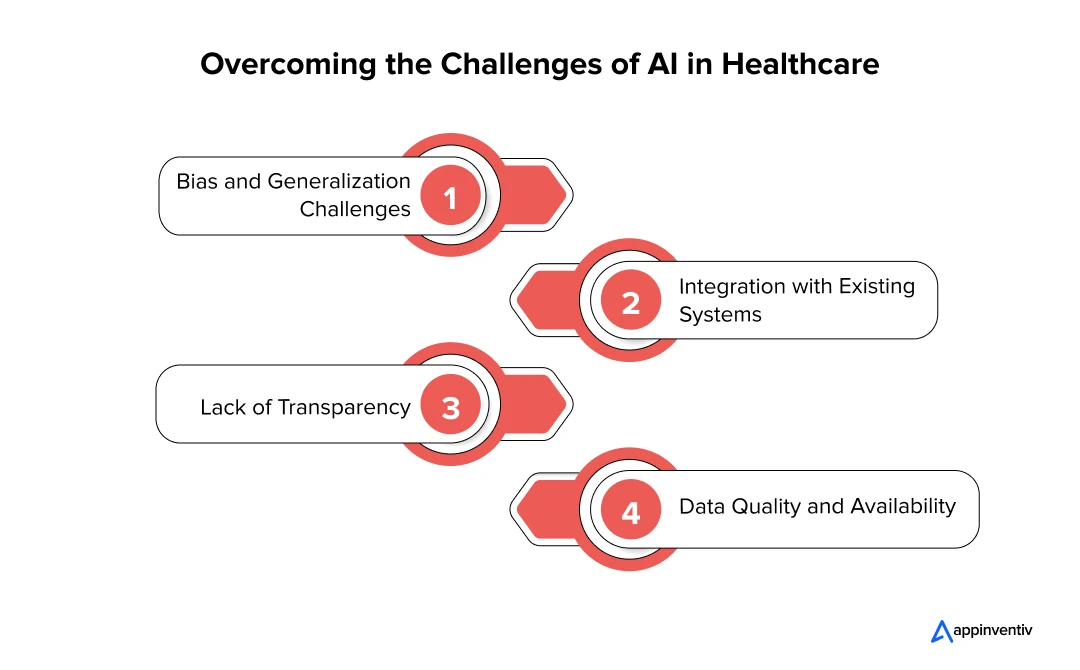
Bias and Generalization Challenges
Limitation: AI systems may face challenges in generalizing across the UAE’s diverse population, leading to biased or inaccurate outcomes, especially if training datasets lack sufficient representation of various demographics.
Solution: To address this issue, AI models must be trained on diverse, representative datasets that reflect the full spectrum of patient demographics, ensuring that the technology delivers more accurate and inclusive predictions.
Integration with Existing Systems
Limitation: Many healthcare institutions in the UAE still rely on legacy systems, which can create barriers to effectively integrating AI technologies and optimizing healthcare operations.
Solution: Modernizing the country’s healthcare infrastructure by upgrading legacy systems and ensuring AI compatibility will facilitate smoother integration. This will enable healthcare providers to leverage AI’s full potential and deliver more efficient care.
Lack of Transparency
Limitation: Many AI algorithms used in healthcare systems, particularly deep learning models, operate as “black boxes,” which makes it difficult for healthcare providers to understand how decisions are made or trust AI recommendations.
Solution: By investing in explainable AI (XAI) technologies, Dubai can ensure that healthcare professionals gain insight into AI decision-making processes, improving transparency, trust, and the effective application of AI in clinical environments.
Data Quality and Availability
Limitation: In the UAE’s healthcare sector, AI technologies depend on large, high-quality datasets, but data across various healthcare systems can be fragmented, incomplete, or unstructured, limiting the effectiveness of AI models.
Solution: To enhance AI accuracy, the UAE needs to standardize healthcare data and improve interoperability between different systems, allowing for seamless data sharing and better utilization of AI technologies.
Transform your healthcare system with cutting-edge AI solutions tailored by our expert team.
Boost Accuracy | Enhance Efficiency | Reduce Costs
Future of AI in UAE’s Sprawling Healthcare System
UAE’s healthcare system is poised for a transformative shift, with AI technologies pivotal in reshaping medical services. The future of AI in healthcare in Dubai, UAE, will be defined by innovations such as generative AI, large language models (LLMs), and digital twins, revolutionizing diagnostics, personalized treatment, and medical research.
Generative AI in healthcare in Dubai, UAE, will enable faster, more accurate decision-making, while LLMs will enhance patient interactions and streamline healthcare workflows. Though still emerging, the metaverse holds promise for advancing clinical services, education, and research through immersive virtual environments. Additionally, digital twins in healthcare will enable real-time monitoring and optimize operations, ensuring efficiency and predictive maintenance across facilities.
This approach will strengthen UAE’s position as a leading hub for medical tourism, research, and technological advancement. With AI and emerging technologies at the forefront, the UAE’s healthcare system will continue to evolve, delivering more efficient, personalized care and driving better patient outcomes.
Achieve Seamless AI Integration in Healthcare with Appinventiv Dubai
The UAE’s healthcare sector rapidly embraces AI-driven innovations that significantly enhance diagnostic accuracy, patient care, and operational efficiency. With initiatives like the Global AI Healthcare Academy and groundbreaking technologies like Med42’s clinical language model and AIRIS-TB, the UAE is leading the charge in AI integration.
Appinventiv Dubai, as a trusted healthcare app development company, has been a trusted tech partner in this evolution. We have enabled numerous healthcare organizations like Soniphi, Health-e-People, and DiabeticU to enhance patient care and streamline operational management with greater efficiency by developing advanced, technology-driven healthcare platforms.
For instance, Health-e-People is a prime example of how our healthcare IT consulting services drive meaningful results. This innovative platform provides user-centric solutions, streamlining patients’ and caregivers’ healthcare record management.
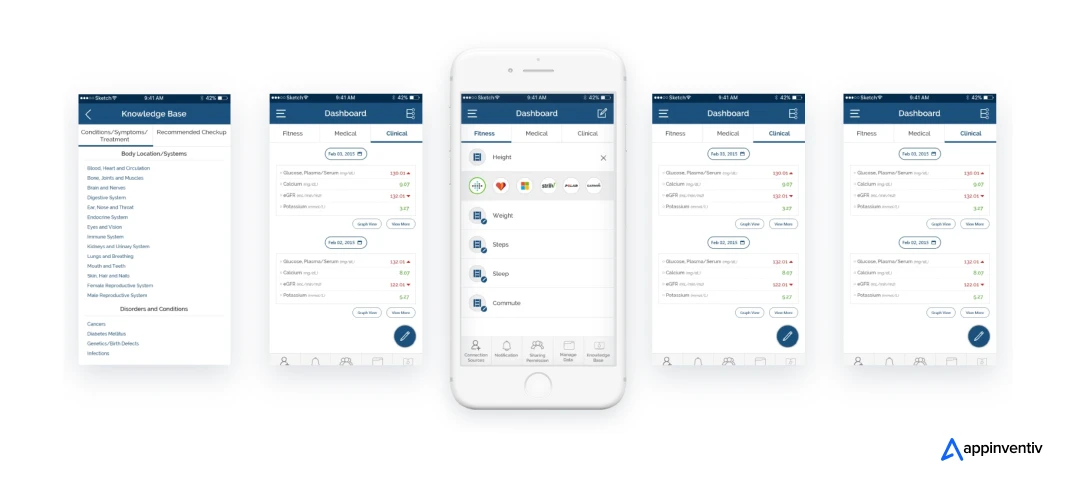
Through the expertise and efforts of our team, Health-e-People has evolved into the top choice for personalized healthcare, benefiting users across the board.
By collaborating with an AI development company in Dubai like Appinventiv, you can seamlessly integrate AI into your healthcare infrastructure, create intelligent solutions tailored to your needs, and be at the forefront of the healthcare revolution.
Let our experts guide you in harnessing the power of AI to optimize processes, elevate care, and create a sustainable future for healthcare delivery.
FAQs
Q. How is AI transforming the UAE healthcare ecosystem?
A. Here’s how advanced technologies like Artificial intelligence in UAE’s healthcare industry play a significant role:
- Telemedicine: AI-powered virtual assistants and telemedicine apps enable remote consultations, making healthcare more accessible.
- Disease Surveillance: AI monitors and predicts disease outbreaks, supporting quicker and more effective public health responses.
- Operational Efficiency: AI automates administrative processes, allowing healthcare professionals to focus more on patient care.
- Improved Diagnostics: AI tools like Med42’s Clinical Language Model and AIRIS-TB enhance the accuracy and speed of diagnoses.
- Personalized Treatment: AI assists in customizing treatment plans and identifying potential health risks for better prevention.
- Radiology & Imaging: AI automates radiology tasks, such as interpreting X-rays, easing the workload on radiologists and increasing efficiency.
- Accelerated Medical Research: AI analyzes extensive datasets to speed up drug discovery and research advancements.
- Quality Control: AI helps maintain healthcare quality and regulatory compliance, as demonstrated by the Honey Quality Laboratory.
Q. What is the cost of implementing Artificial Intelligence in healthcare in the UAE ?
A. The cost of implementing Artificial intelligence in healthcare in the UAE can range from $50,000 to $400,000 (AED 183,500 to AED 1,468,000). Smaller-scale projects, such as AI-powered diagnostic tools, may cost around $50,000 to $150,000 (AED 183,500 to AED 550,500), while larger-scale implementations, including hospital-wide AI systems, can range from $200,000 to $400,000 (AED 734,000 to AED 1,468,000). Ongoing maintenance and compliance may add another $10,000 to $50,000 (AED 36,700 to AED 183,500) annually.
To know more about the cost of implementing AI in healthcare in Dubai, connect with our experts today!
Q. What are the benefits of AI in healthcare?
A. Here are some of the key benefits of implementing AI in healthcare systems:
- Faster Drug Development
- Operational Efficiency
- Improved Diagnosis
- Predictive Capabilities
- Cost Efficiency
- Continuous Monitoring
- Telemedicine Support


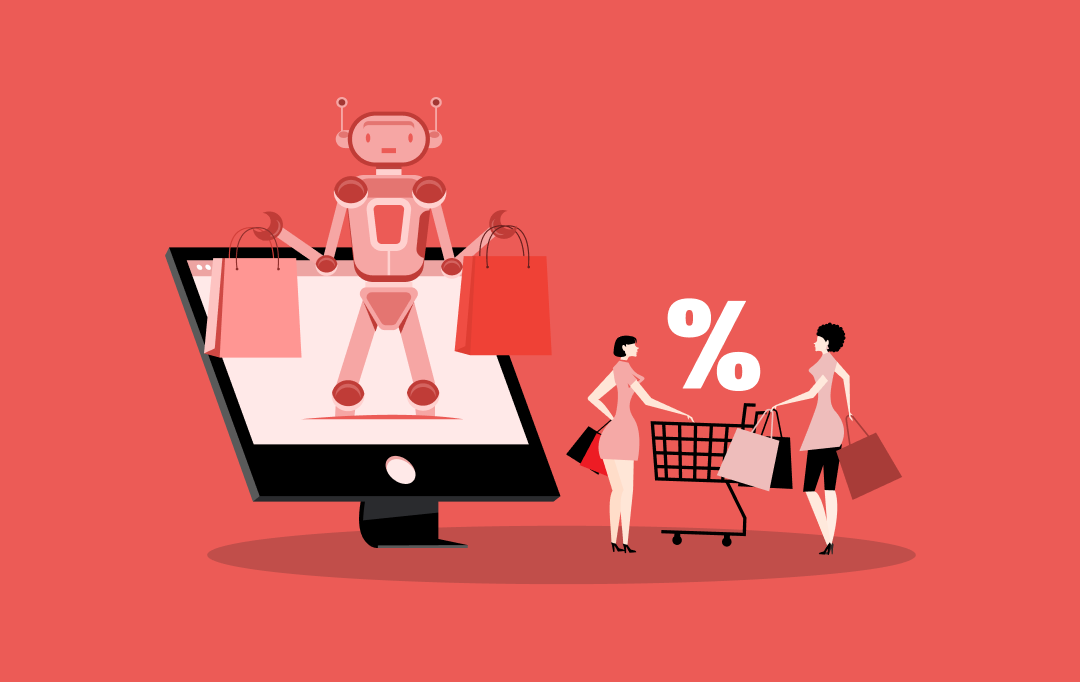
10 Use Cases and Benefits of How AI Agents Are Revolutionizing the Retail Industry
Key takeaways: AI agents in the retail industry are revolutionizing businesses by enhancing customer experience and streamlining operations. From personalized recommendations to predictive analytics, AI offers tangible benefits like increased conversions and reduced costs. AI adoption can lead to scalable growth and a competitive edge in the retail industry. Retailers must consider data strategies, talent…
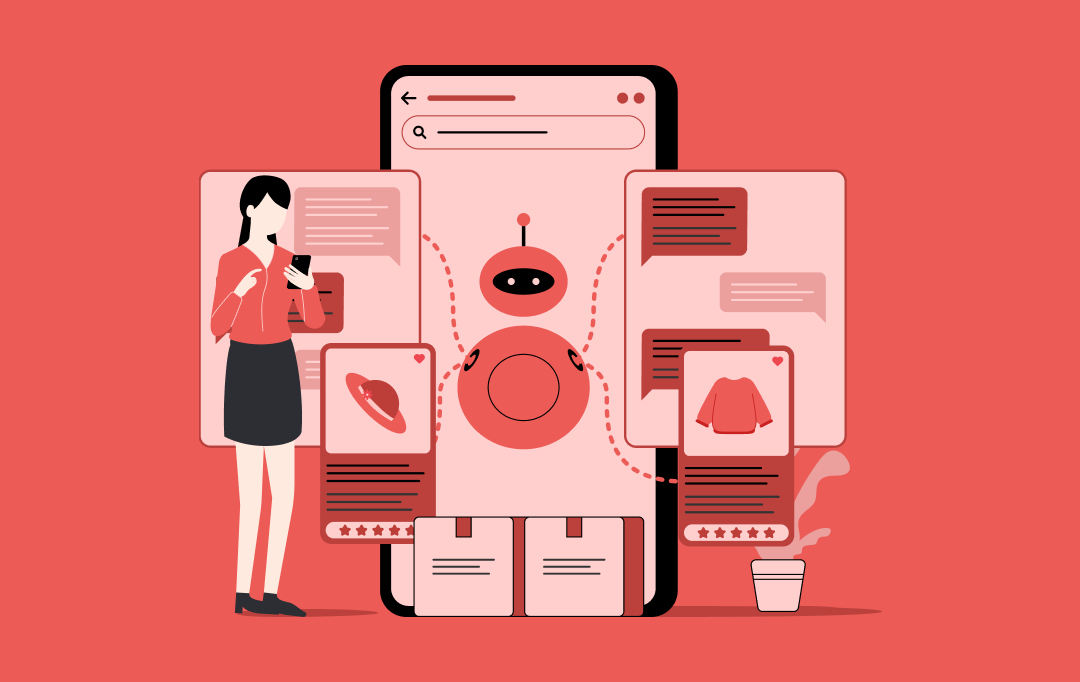
12 Ways AI is Revolutionizing the Fashion Industry
Key takeaways: AI in fashion is booming, with a market value of $28.48 billion by 2032 and a 39.43% CAGR. It's transforming design, trends, shopping, manufacturing, and customer service. Top brands like Zara and H&M report 200% higher conversions, 64% fewer returns, and 25% better retention. Success demands strategy, data infrastructure, and phased AI integration…
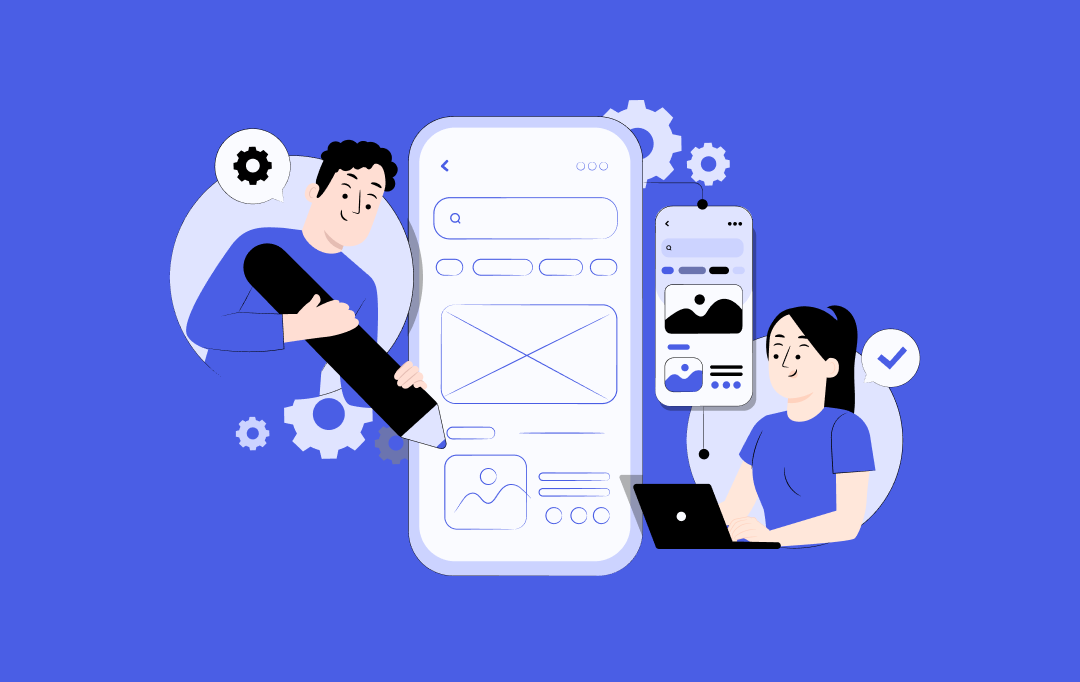
How Much Does It Cost to Build an App like Janitor AI?
Key takeaways: Cost Breakdown: The cost of app development varies, with an MVP App costing $40,000 to $90,000, a Mid-Tier App costing $100,000 to $200,000, and an Enterprise Grade App costing $300,000 to $ 500,000 or more, depending on features, complexity, and the expertise of the development team. Key Factors: Platform choice, AI integration, and…







